Arts & Entertainment
Oscars so safe
Fraser wins for playing gay in ‘Whale,’ but night belonged to ‘Everything’
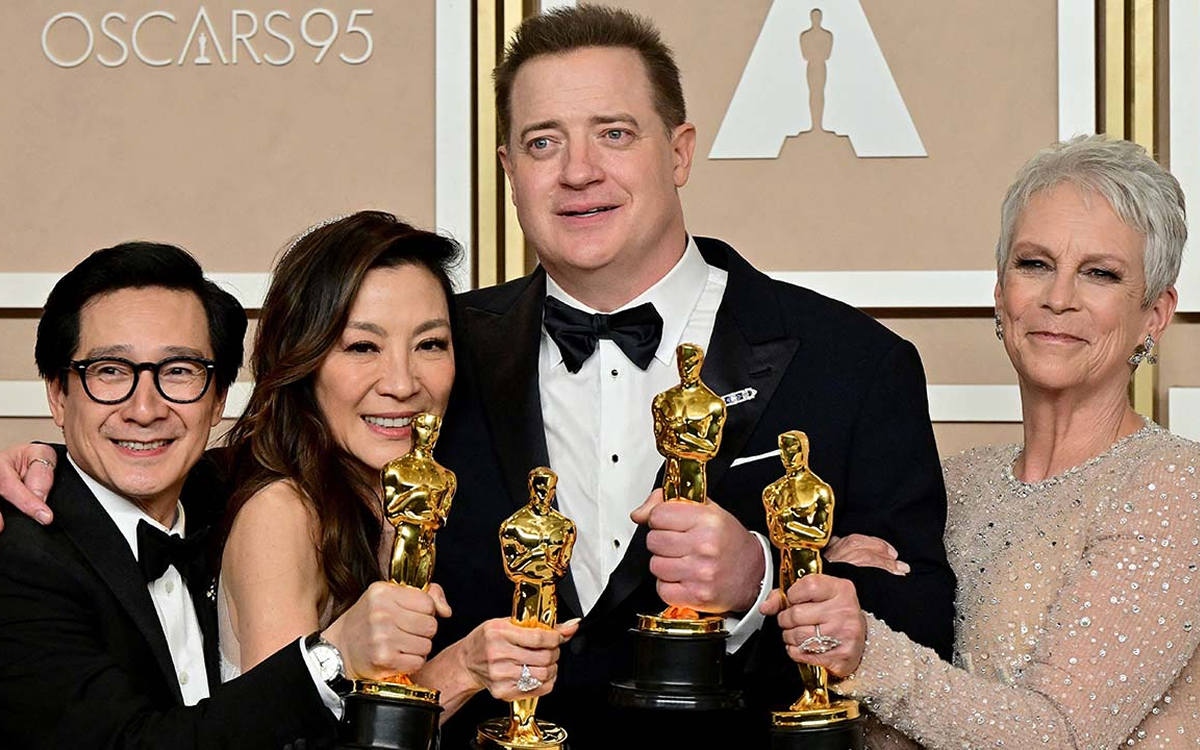
It must be said that the 95th Annual Academy Awards were doomed to be a letdown before they ever started. After all, last year’s ceremony included a physical assault on a presenter by an A-lister – who then proceeded to win the Best Actor award! Even by rewarding an indie underdog for becoming a populist hit by giving it a record-setting sweep of the major categories, how could this year’s Oscar broadcast hope to top that?
Snarky digs aside, the Academy had already squandered a lot of its good will by announcing a slate of nominees that seemed a step backward in its recent efforts toward diversity. While 2022’s honors included overdue recognition for Asian American talent, the notable shortage of people of color or LGBTQ individuals among the nominees had already led many observers to write off this year’s Oscars as just another backsliding return to the all-too-familiar status quo; and when the broadcast itself finally happened, the Jimmy Kimmel-led ceremony played it so safe that the proceedings seemed dull even in comparison to other Oscar shows – and as anyone who’s ever watched one will certainly attest, that’s saying a lot. It’s almost as if, after a few years of pushing the boundaries, controversy, and conservative backlash over a perceived capitulation to “woke” sensibilities had pressured the Academy into a return to business as usual.
In fairness, that assessment feels a little unreasonable, considering that “Everything Everywhere All at Once” – a movie in which the survival of multiple universes hinges in no small part on a mother’s acknowledgment and acceptance of her child’s queer sexuality – had enough critical and popular momentum going into the ceremony to make its claiming of the top prize all but inevitable. The popular surprise indie sci-fi hit claimed that prize and more – including Best Actress for cinema icon Michelle Yeoh and supporting honors for co-stars Ke Huy Quan and Jamie Lee Curtis, as well as wins in the Direction and Original Screenplay categories for filmmakers Daniel Scheinert and Daniel Kwan – to take home an impressive seven of the 11 awards for which it was nominated; child-actress-turned-celebrated-filmmaker Sarah Polley, while shut out of the Best Director category for “Women Talking” in favor of an all-male roster of nominees, took the prize for Best Adapted Screenplay nevertheless; Best Actor winner Brendan Fraser, while himself not gay, earned his victory for a deeply humanizing portrayal of a gay man and is a very public survivor of alleged same-gender sexual harassment in the workplace – a reminder that #MeToo is not just a “women’s issue” but a cause encompassing even those in positions most seemingly insulated from such abuses.
All these winning films – as well as numerous others among their fellow winners and nominees –are queer-inclusive, if not directly queer-focused. Though other queer nominees – like Belgian director Lukas Dhont’s “Close” for Best International Feature and Laura Poitras’ Nan Goldin profile “All the Beauty and the Bloodshed” for Best Documentary Feature – failed to take their respective categories, the overall queer presence represented in this year’s nominated films is too widespread and deeply integrated to be ignored.
Still, in today’s very divided cultural atmosphere, such equivocating overtures toward a more equitable Oscar playing field can undeniably feel like hollow, insincere tokens, convenient to bestow on their non-LGBTQ recipients thanks to the more universal appeal of the movies that earned them a place at the table; and while the wins for Yeoh and nostalgic Gen X fan favorite Quan represented historic firsts for Asian American inclusion, nominations for Viola Davis in “The Woman King” and “Till” star Danielle Deadwyler as Best Actress, or for Jeremy Pope and Gabrielle Union of “The Inspection” as Best Actor and Supporting Actress, respectively, would have gone a lot further toward proving the Academy’s commitment to true diversity than its loading of the stage with an ostentatiously multi-ethnic roster of presenters – an overcompensation tactic that becomes increasingly obvious every time they deploy it.
As for the ceremony itself, there were some highlights, such as Lady Gaga, with a face freshly scrubbed of her red carpet makeup, passionately delivering a performance of nominated song “Hold My Hand” from “Top Gun: Maverick,” or fellow pop diva Rihanna’s rendition of “Lift Me Up” from “Wakanda Forever” – not to mention the wildly entertaining production number staged to the eventual Best Song winner, “Naatu Naatu” from the Indian blockbuster “RRR.” So, too, were there memorable moments from among the presentations, like the infectious wave of authentic joy that met Quan’s and Curtis’ early wins or Fraser’s genuinely choked-up, self-effacing acceptance speech, as well as a few polite-but-pointed barbs and zingers aimed at various low-hanging political targets – and, of course, at Will Smith – along the way. Even so, the atmosphere of the evening was decidedly contained, marked by a frankly uncharacteristic effort from Hollywood’s elite to remain on their best behavior and avoid ruffling too many feathers – and while that may have made for an evening relatively free of controversy, it also resulted in an Academy Awards show arguably far less entertaining than some of the notoriously embarrassing debacles they’ve produced in past years.
With all that in mind, it’s easy to see Sunday night’s Oscar ceremony as just another validation for people who loathe the Oscars. Yet while the Academy might seem to be some monolithic organization handing out decrees, its awards are bestowed by a voting body made up of individual film professionals, each with their own opinions about who the winners should be, and many of whom likely feel no obligation toward following whatever cultural or political agendas the organization itself may be hoping to advance. That means that whatever good intentions it proclaims itself to have, the Academy will always be little more than a barometer – and, perhaps, a convenient scapegoat – for an industry that perpetually drags its feet. After all, can we really blame the Academy for failing to recognize queer-centric and queer-friendly content – or content centered on any demographic that isn’t white, male, and heterosexual – when there is still so little of it to choose from among the award-worthy movies the mainstream continues to offer us?
There’s no right answer to that question, perhaps, only food for thought as we continue to press Hollywood to do better; that’s the only way we’ll ever see wider inclusion on the big screen. In the meantime, it’s important to remember that deciding the “best” of anything is always an entirely subjective exercise, which means that the Oscars are ultimately less about gauging quality than they are about measuring cultural attitudes toward the content – and the way that content is presented – that the movie industry produces. That makes awards like the Oscars an invaluable tool, perhaps, but does that mean it’s worth putting up with all the shallow, facile, tribalistic conversation that inevitably happens around them?
In a year like this one, when the Academy honors films that uplift and celebrate outsiders, underdogs, and ordinary people, that emphasize kindness and compassion, that allow for resolution and redemption without destructive conflict or violence, then it feels like the answer is yes.
The complete list of winners is below:
Best Picture: “Everything Everywhere All at Once”
Best Actress in a Leading Role: Michelle Yeoh, “Everything Everywhere All at Once”
Best Actor in a Leading Role: Brendan Fraser, “The Whale”
Best Director: Daniel Kwan and Daniel Scheinert,“Everything Everywhere All at Once”
Actress in a Supporting Role: Jamie Lee Curtis, “Everything Everywhere All at Once”
Actor in a Supporting Role: Ke Huy Quan, “Everything Everywhere All at Once”
Best Animated Feature Film: “Guillermo del Toro’s Pinocchio”
Best Original Song: M.M. Keeravani and Chandrabose,“Naatu Naatu,” “RRR”
Best Original Screenplay: Daniel Kwan and Daniel Scheinert,“Everything Everywhere All at Once”
Best Adapted Screenplay: Sarah Polley, “Women Talking”
Best International Feature Film: “All Quiet on the Western Front”
Best Documentary Feature Film: “Navalny”
Best Cinematography: James Friend, “All Quiet on the Western Front”
Best Visual Effects: “Avatar: The Way of Water”
Best Costume Design: Ruth E. Carter, “Black Panther: Wakanda Forever”
Best Makeup and Hairstyling: Adrian Morot, Judy Chin, and Annemarie Bradley, “The Whale”
Best Production Design: Christian M. Goldbeck and Ernestine Hipper,“All Quiet on the Western Front”
Best Film Editing: Paul Rogers, “Everything Everywhere All at Once”
Best Original Score: Volker Bertelmann,“All Quiet on the Western Front”
Best Live Action Short: “An Irish Goodbye”
Best Animated Short: “The Boy, the Mole, the Fox and the Horse”
Best Documentary Short: “The Elephant Whisperers”
Best Sound: “Top Gun: Maverick”
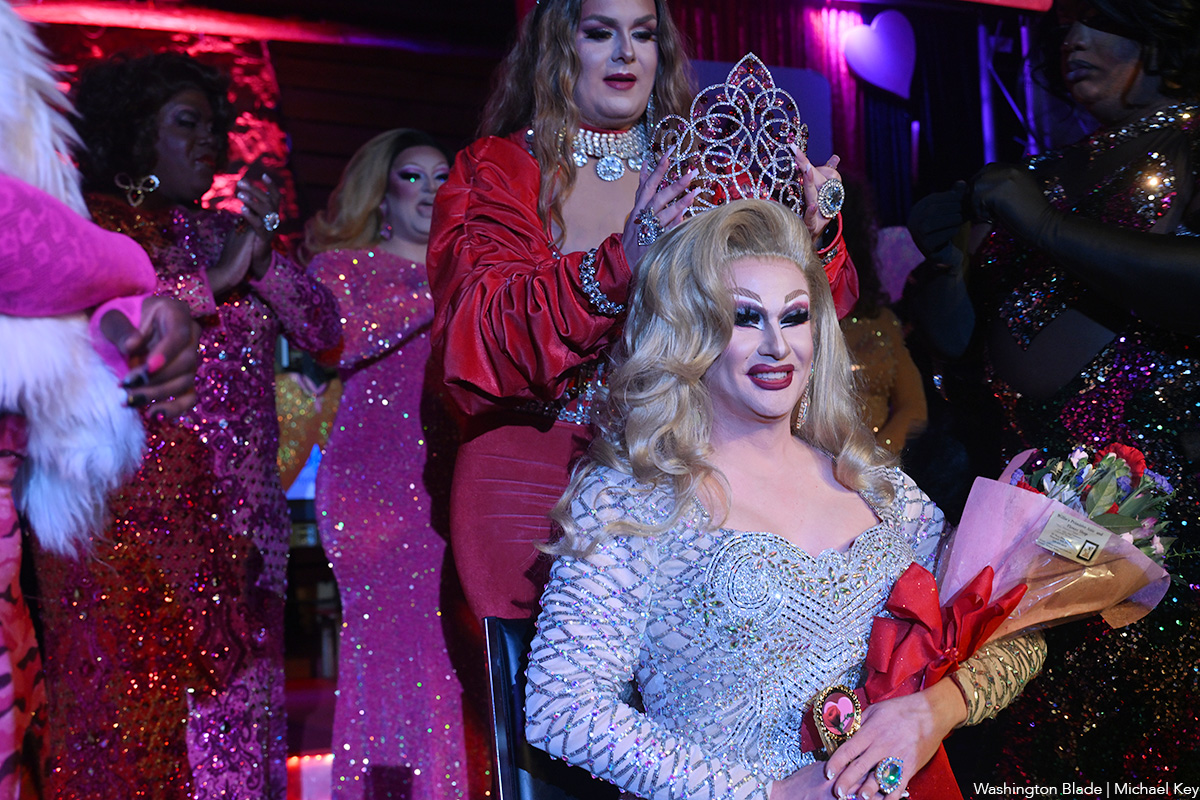
The 44th annual Queen of Hearts pageant was held at The Lodge in Boonsboro, Md. on Friday, Feb. 20. Six contestants vied for the title and Bev was crowned the winner.
(Washington Blade photos by Michael Key)
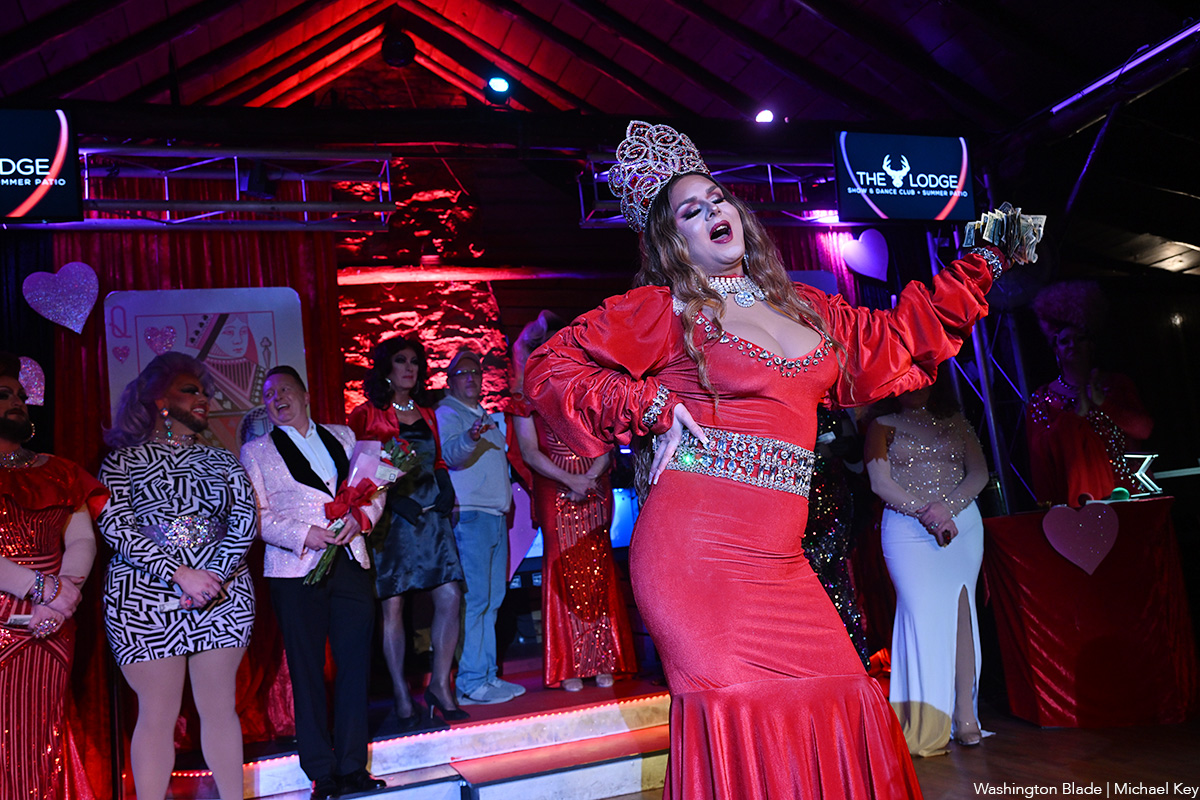
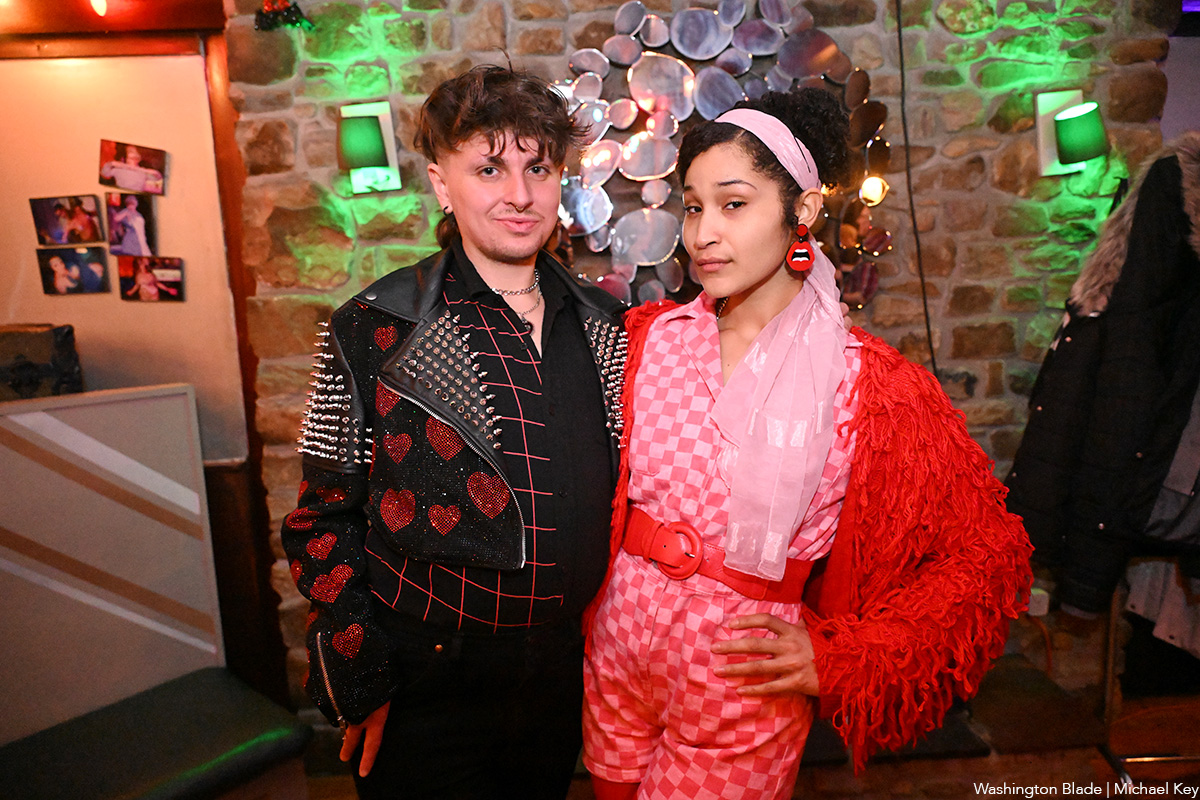
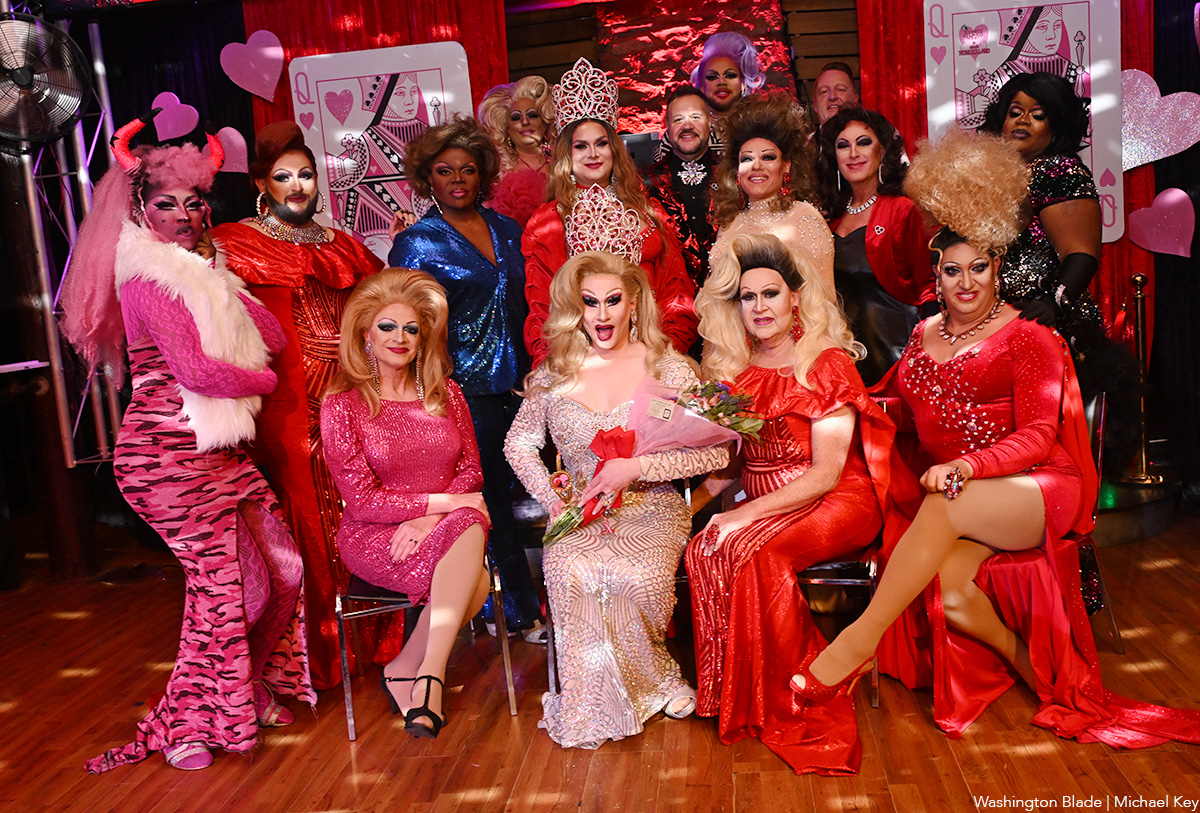
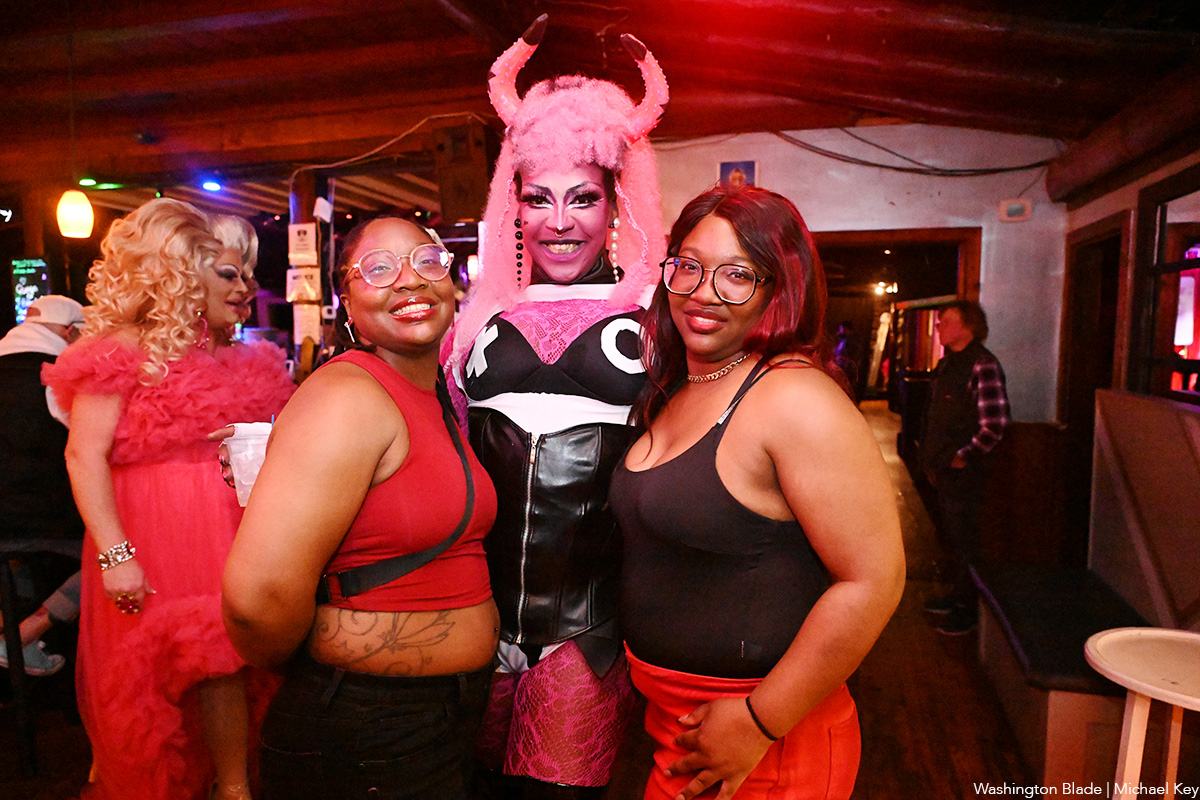
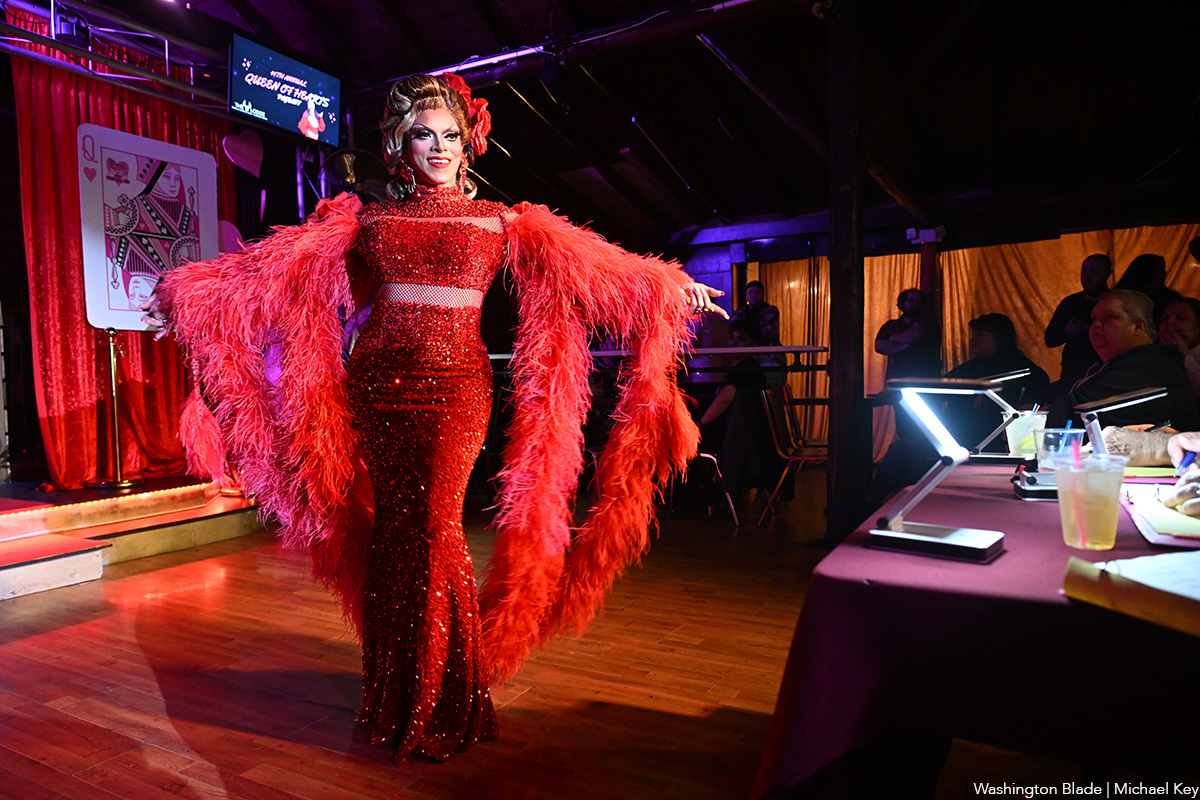
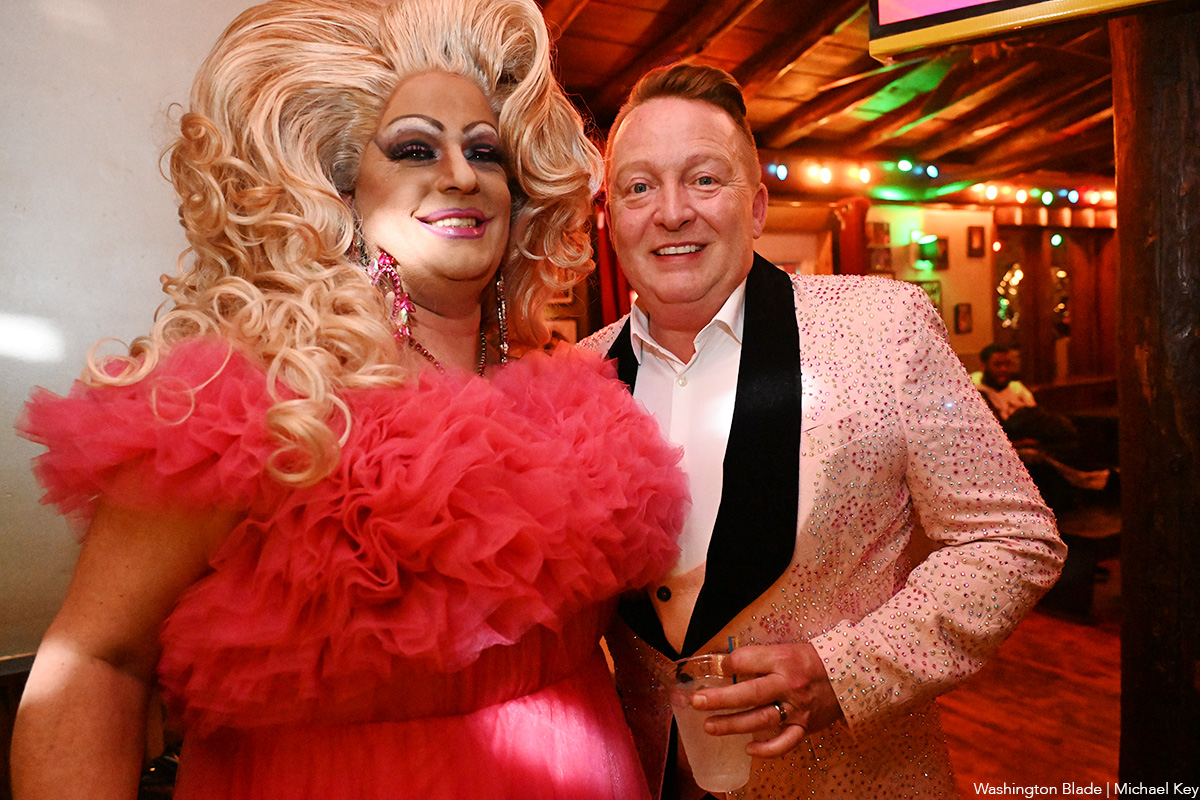
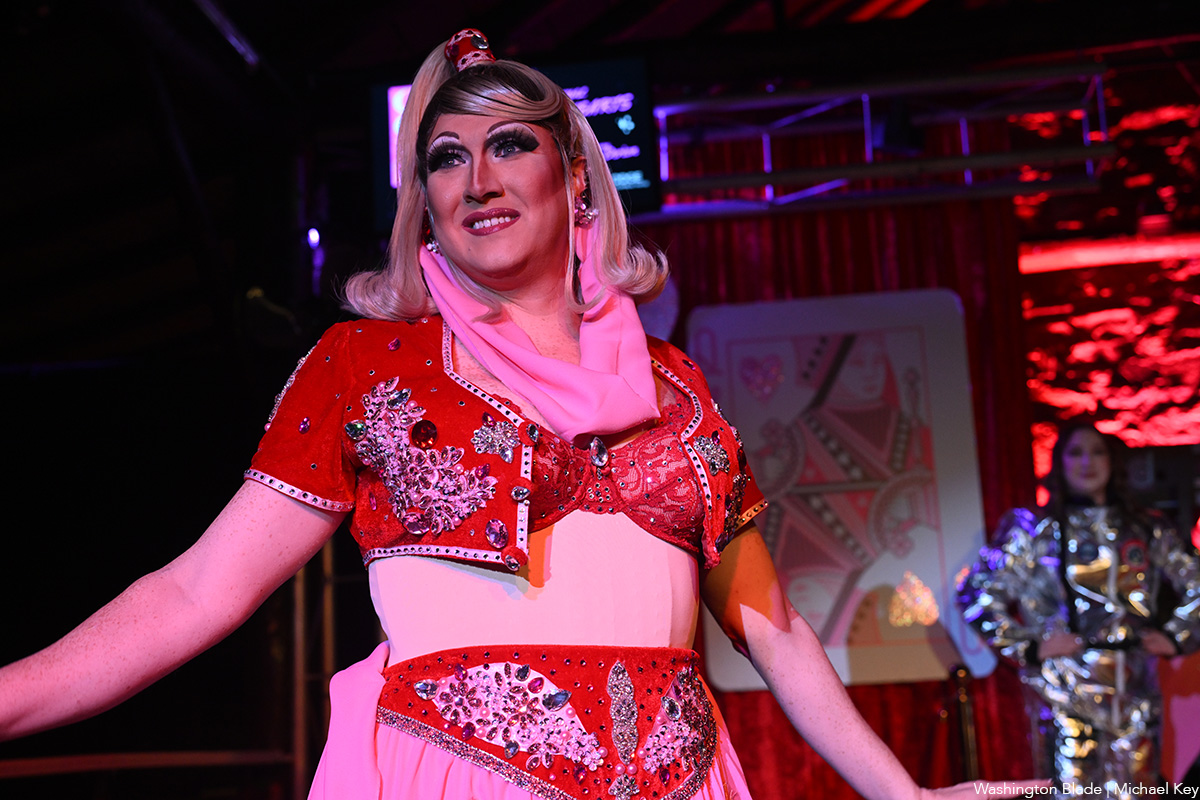

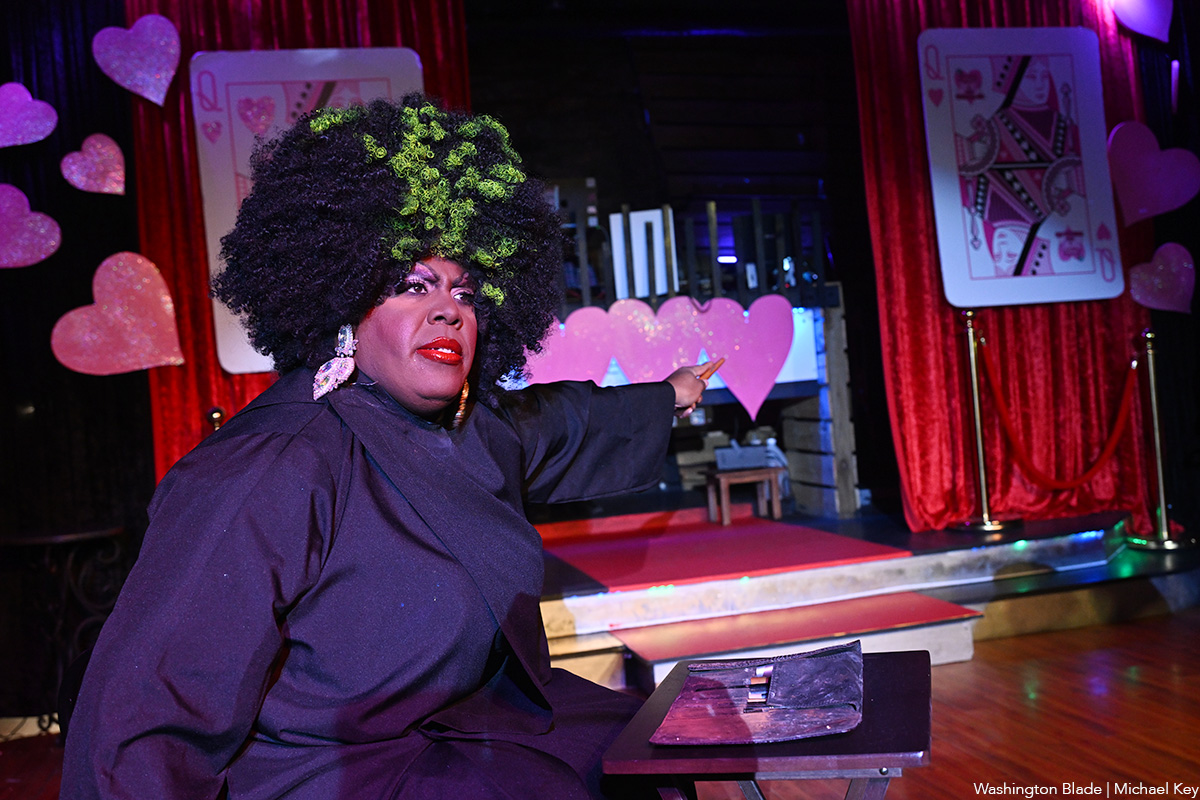
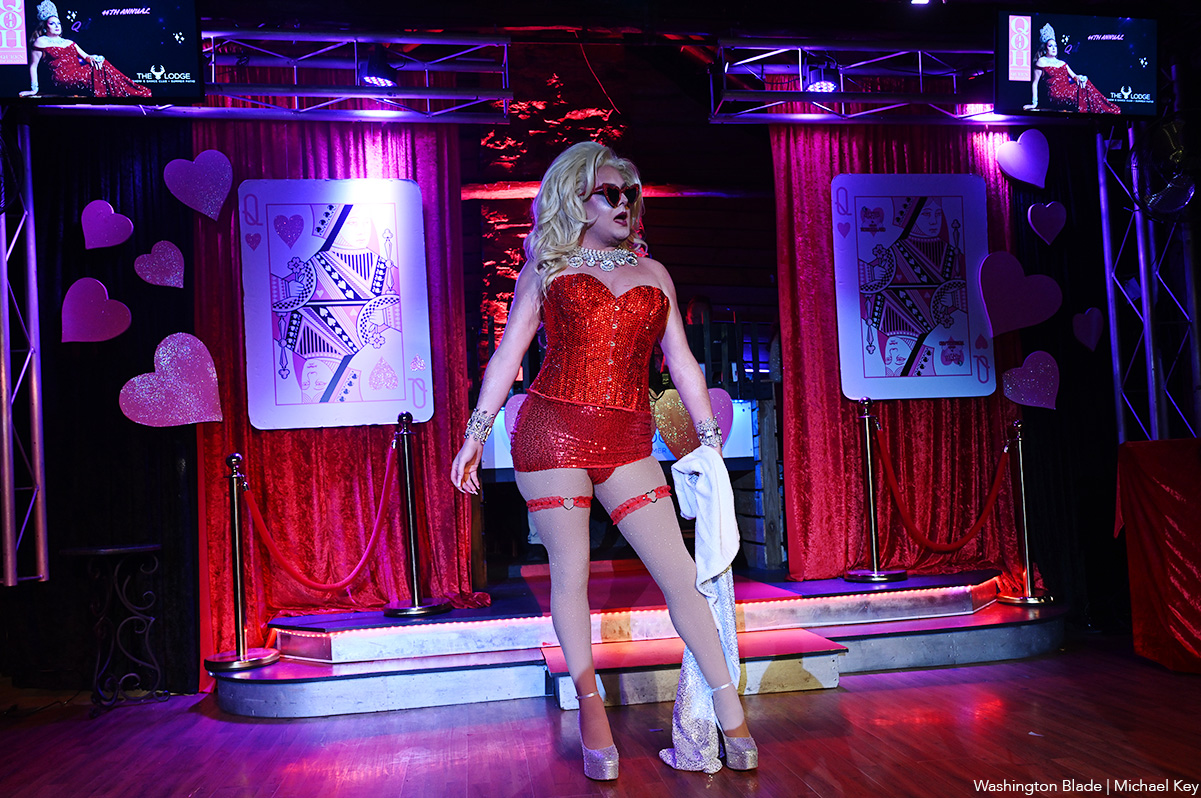
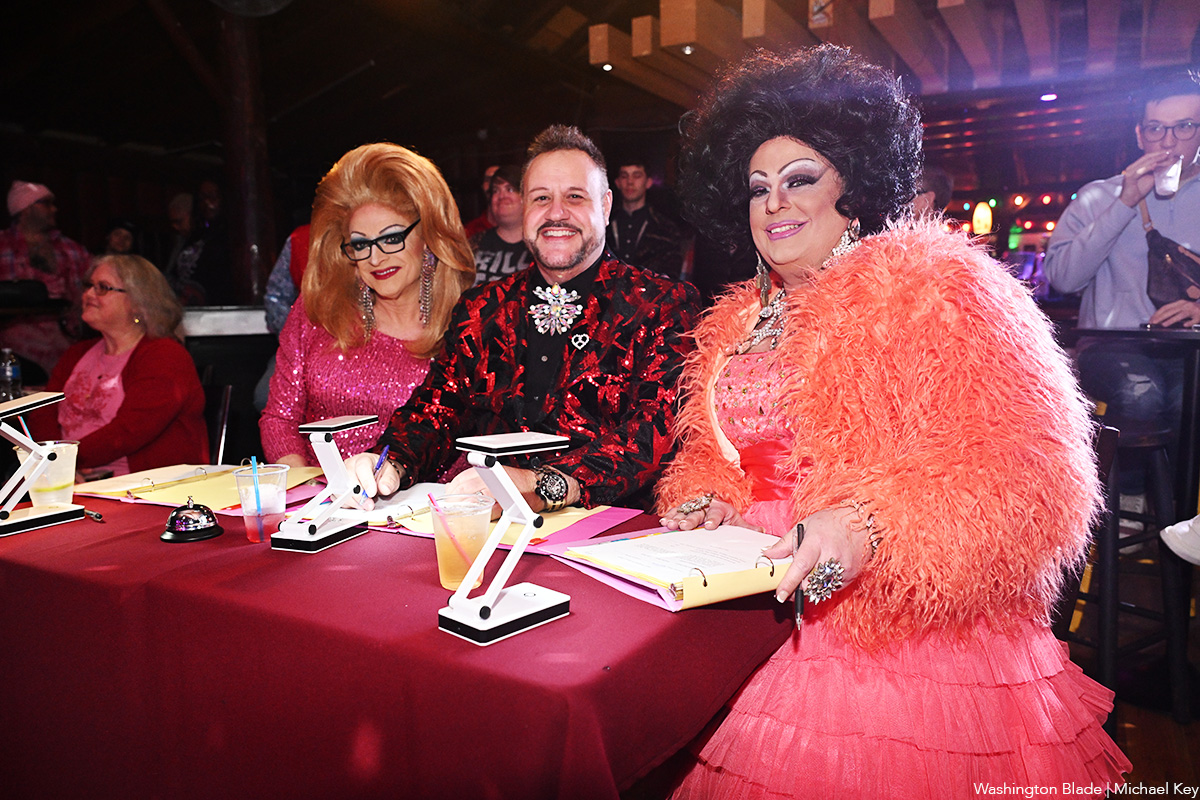
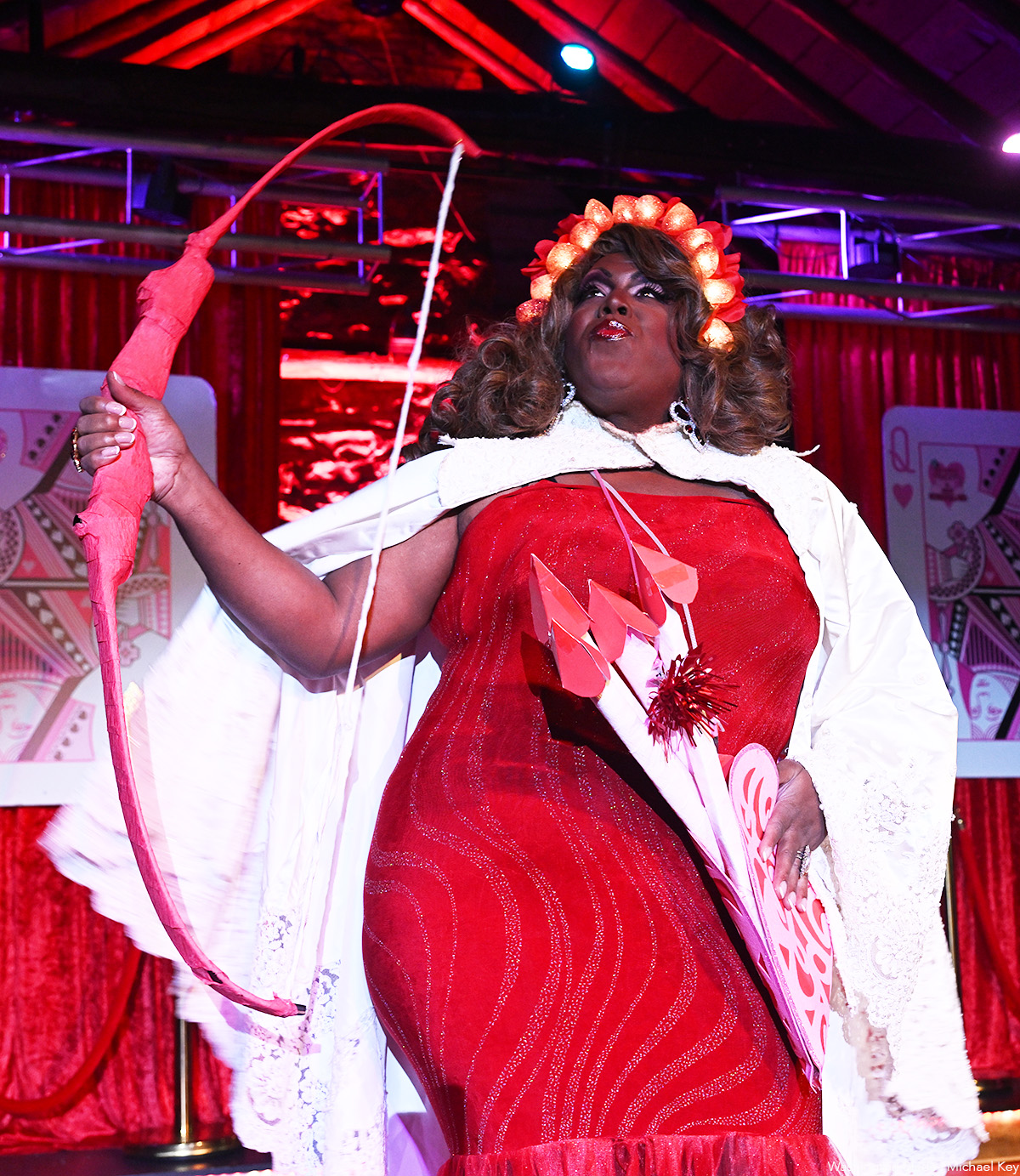
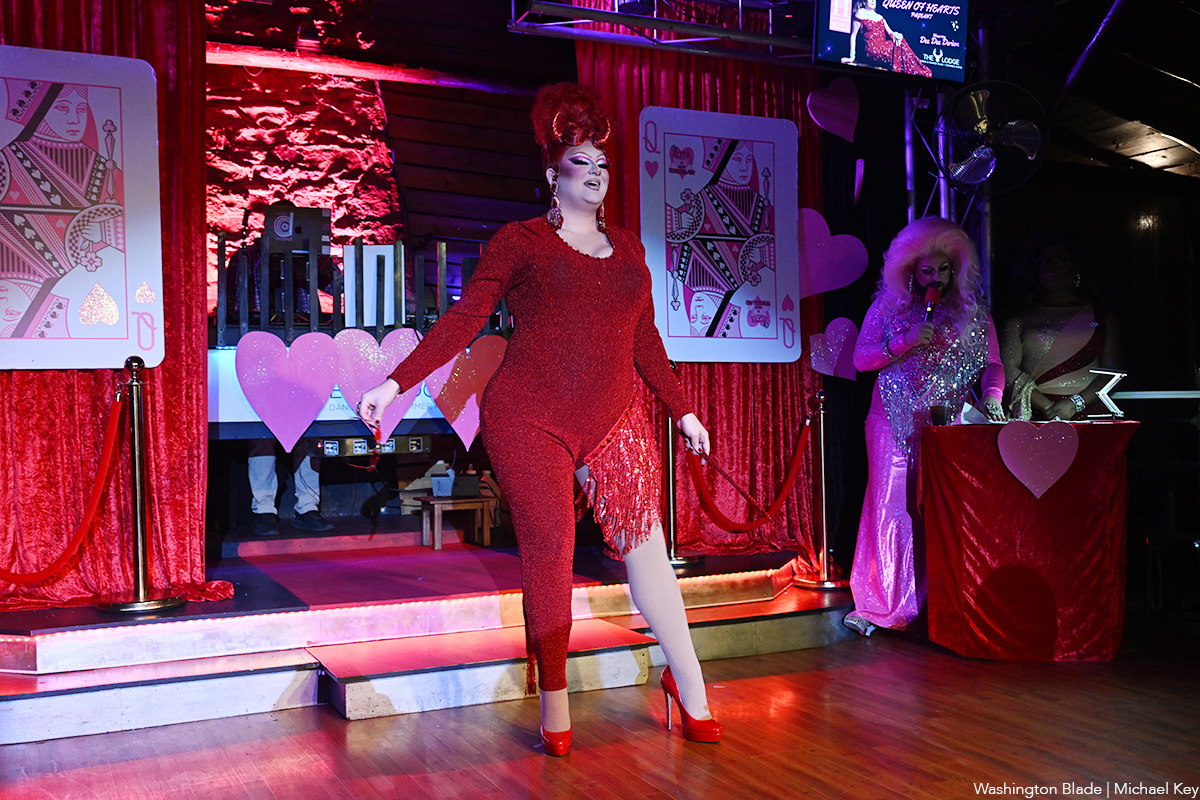
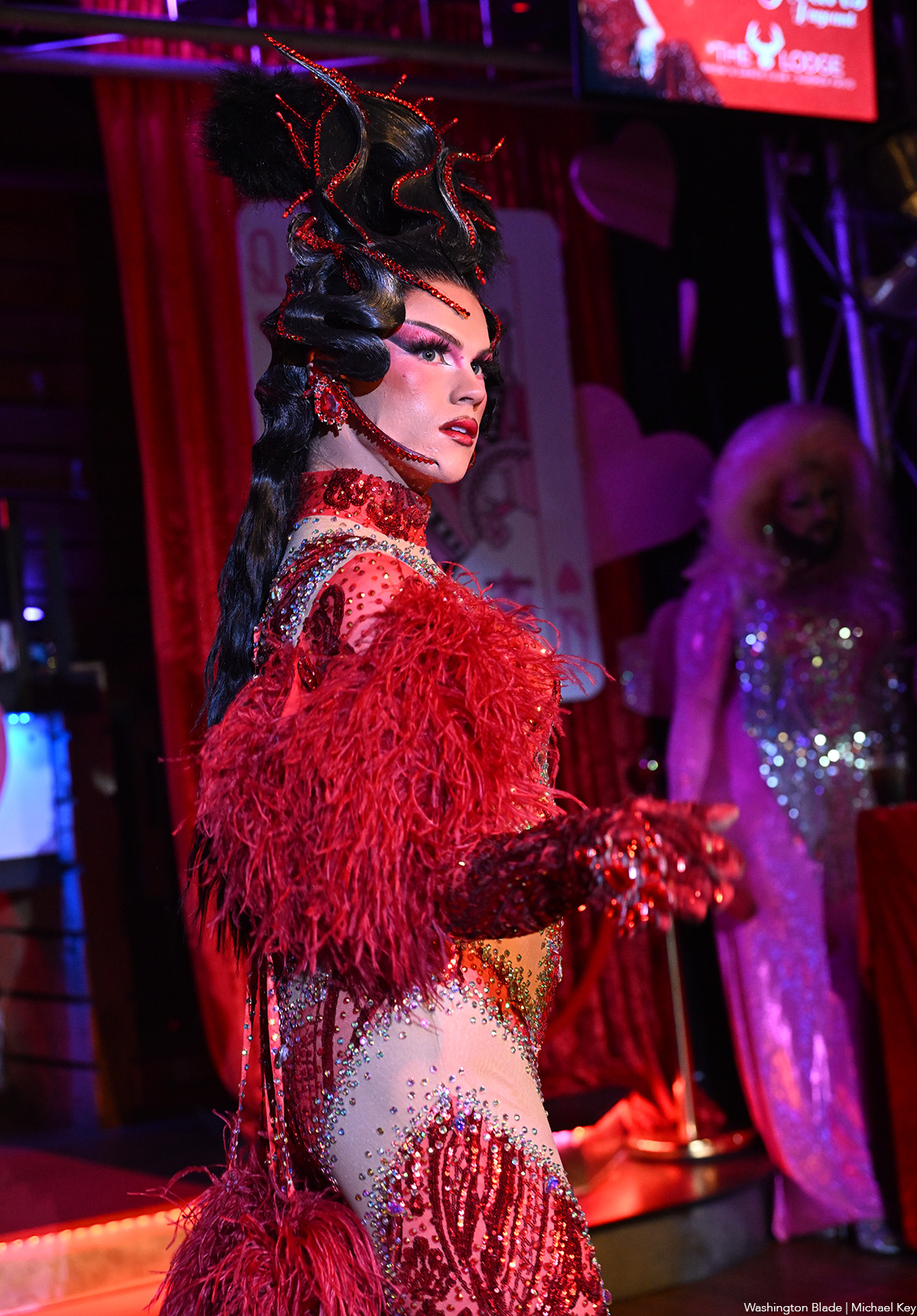
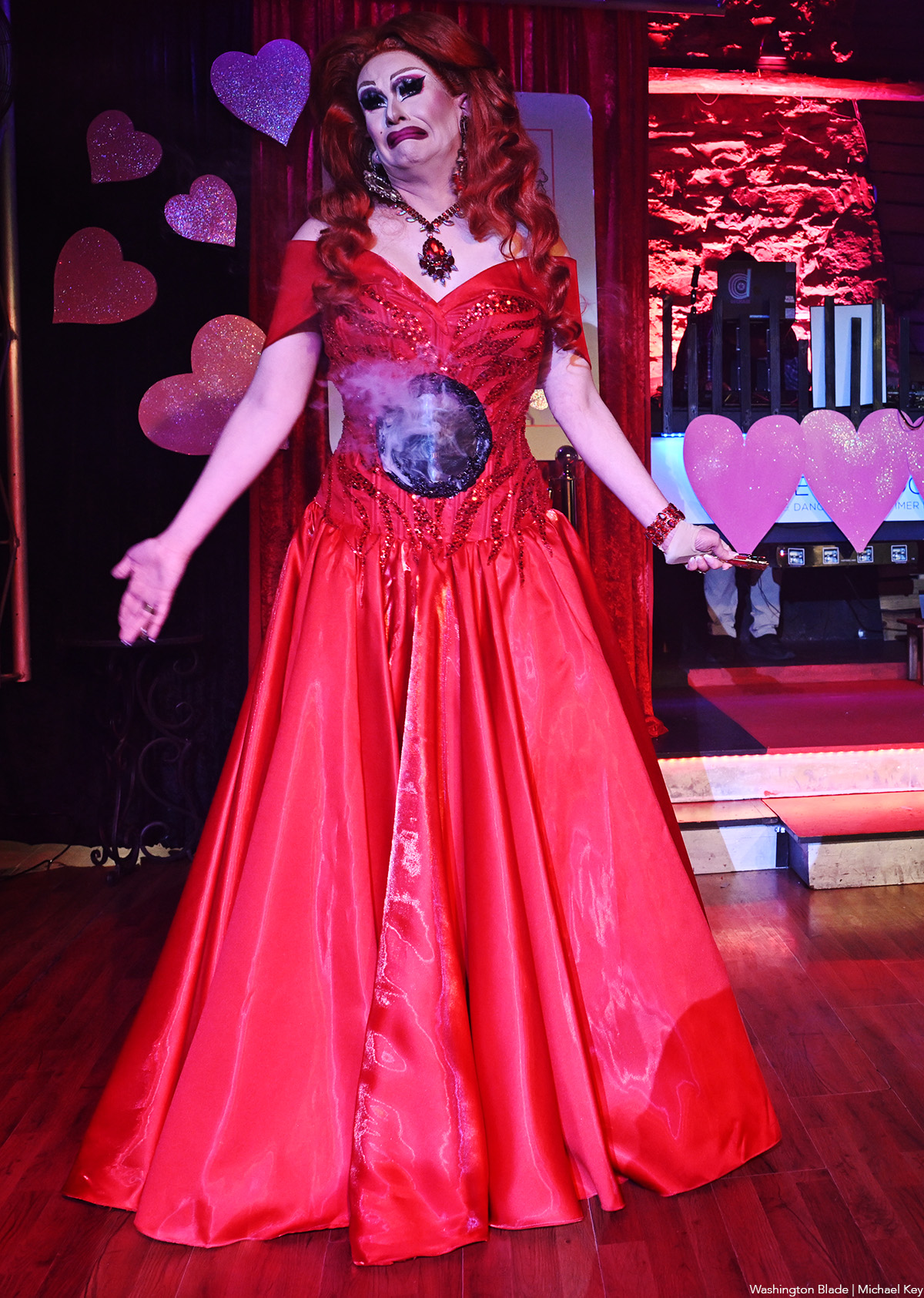
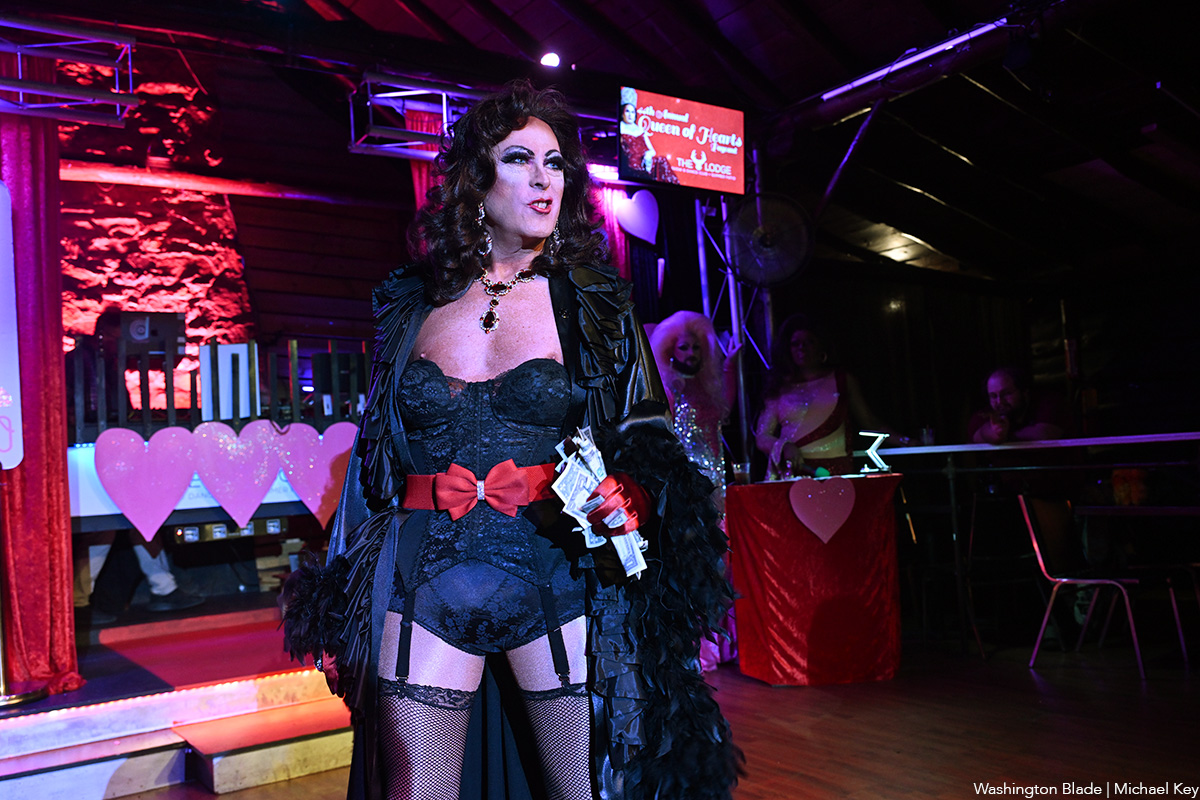
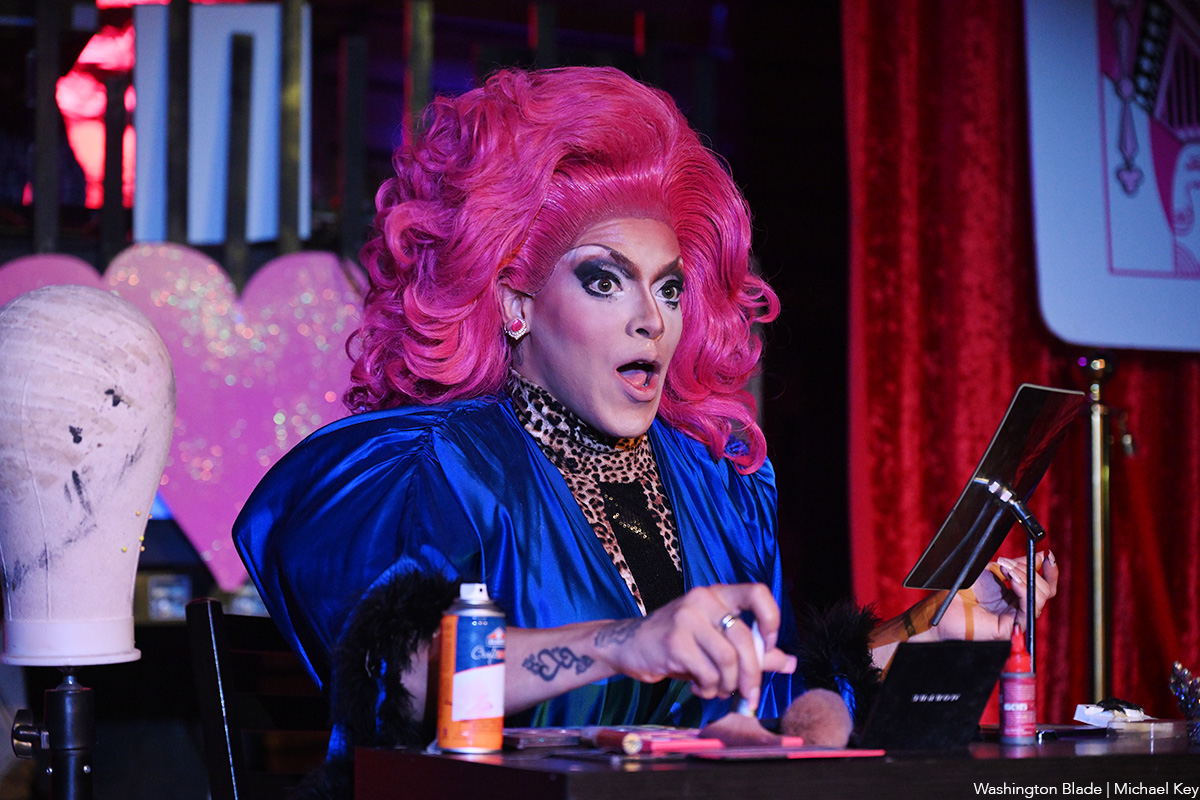
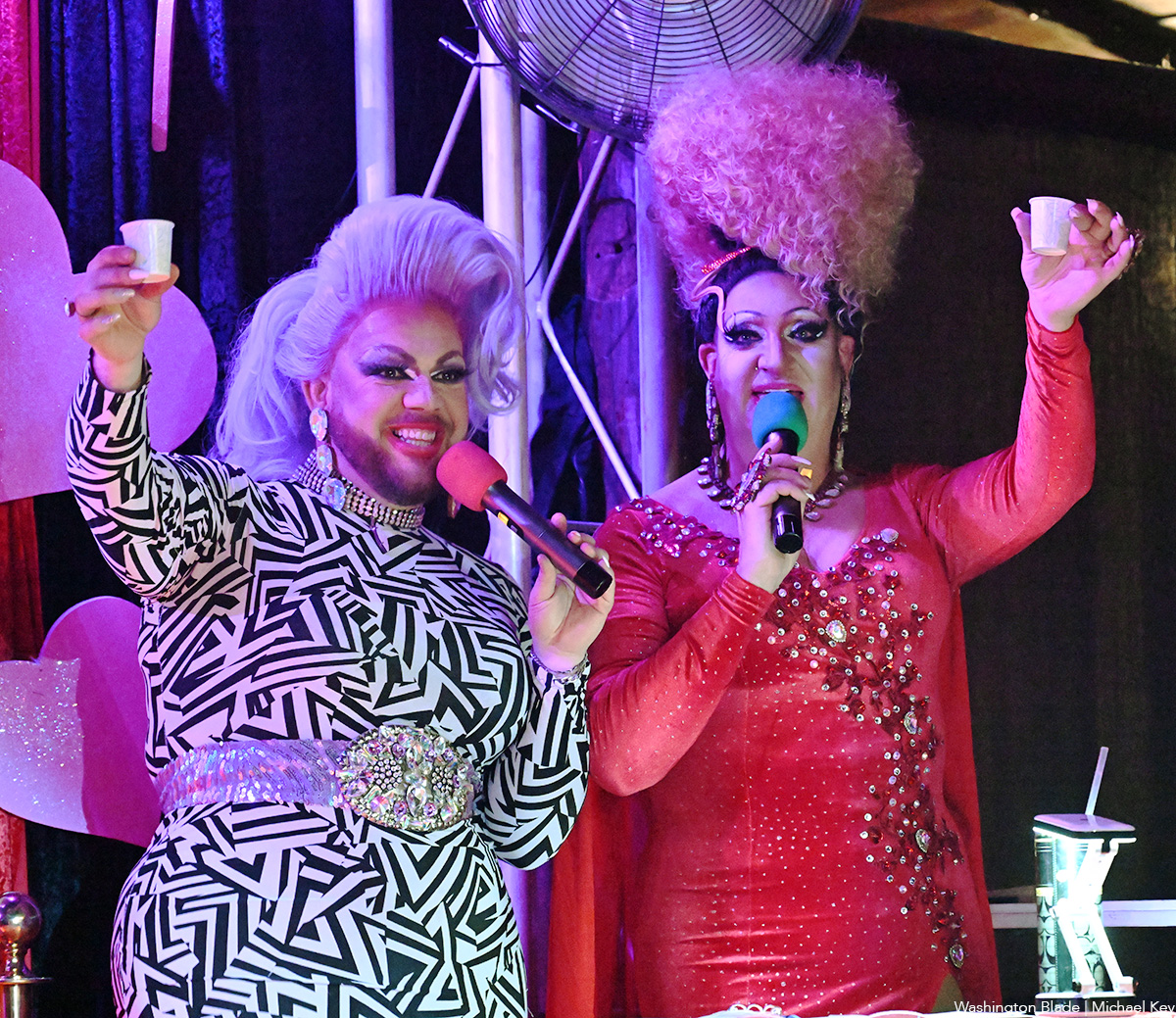
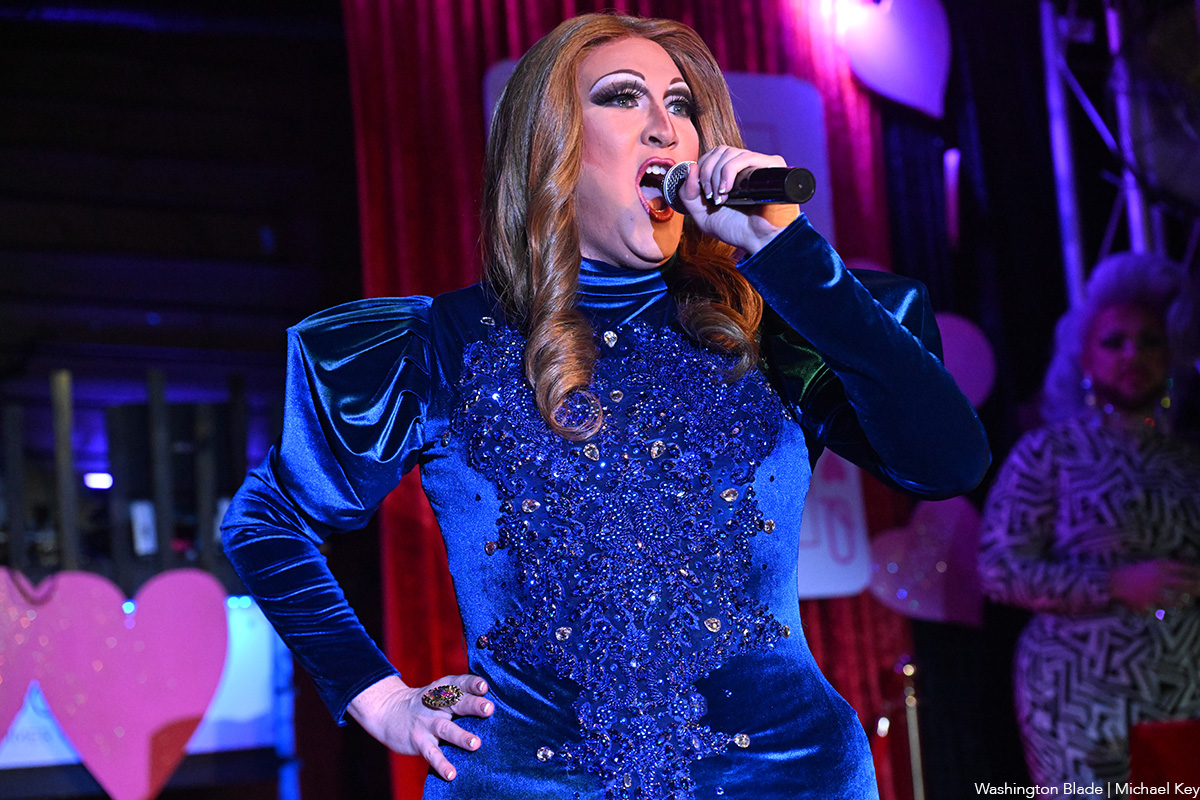
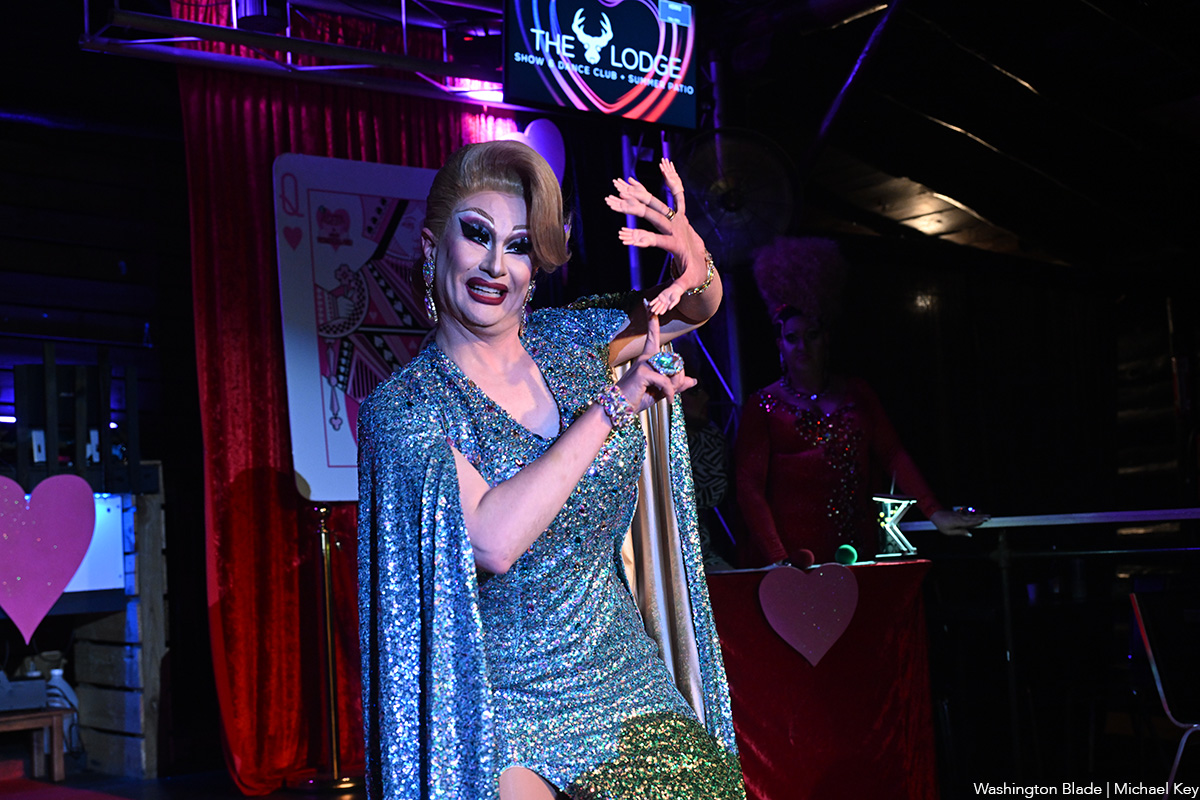
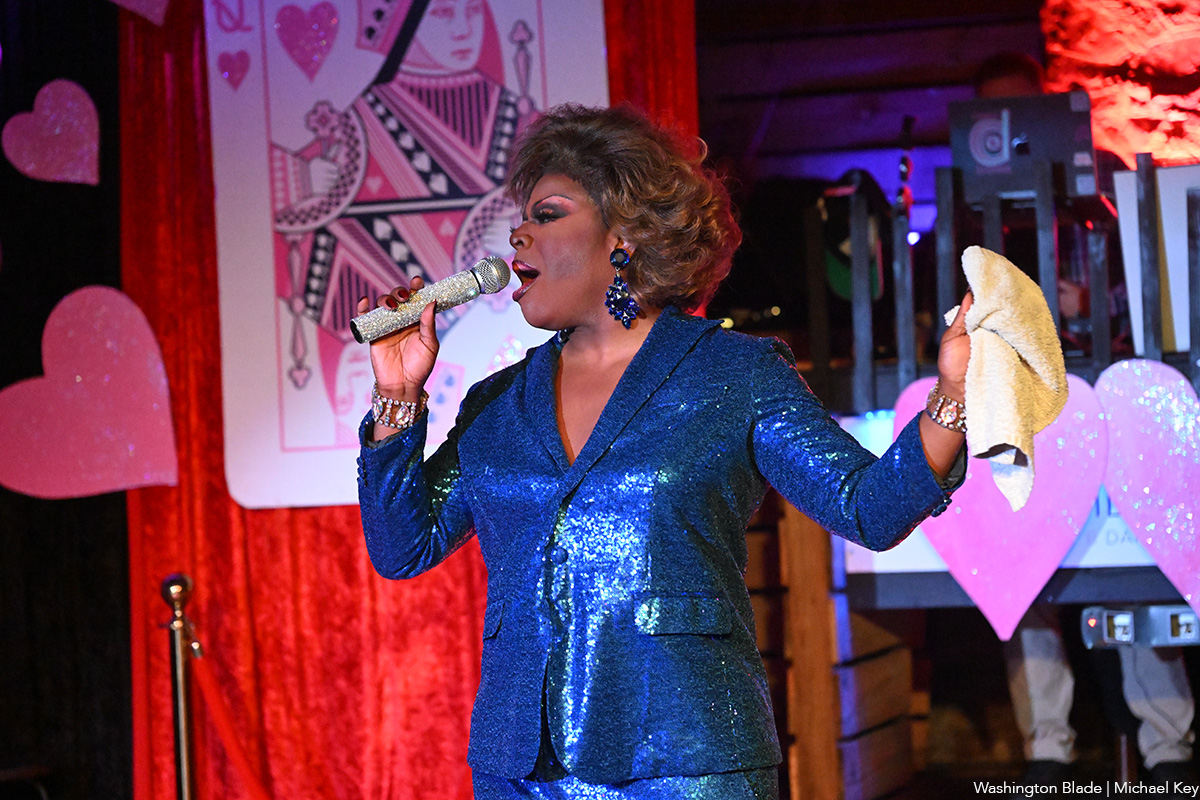
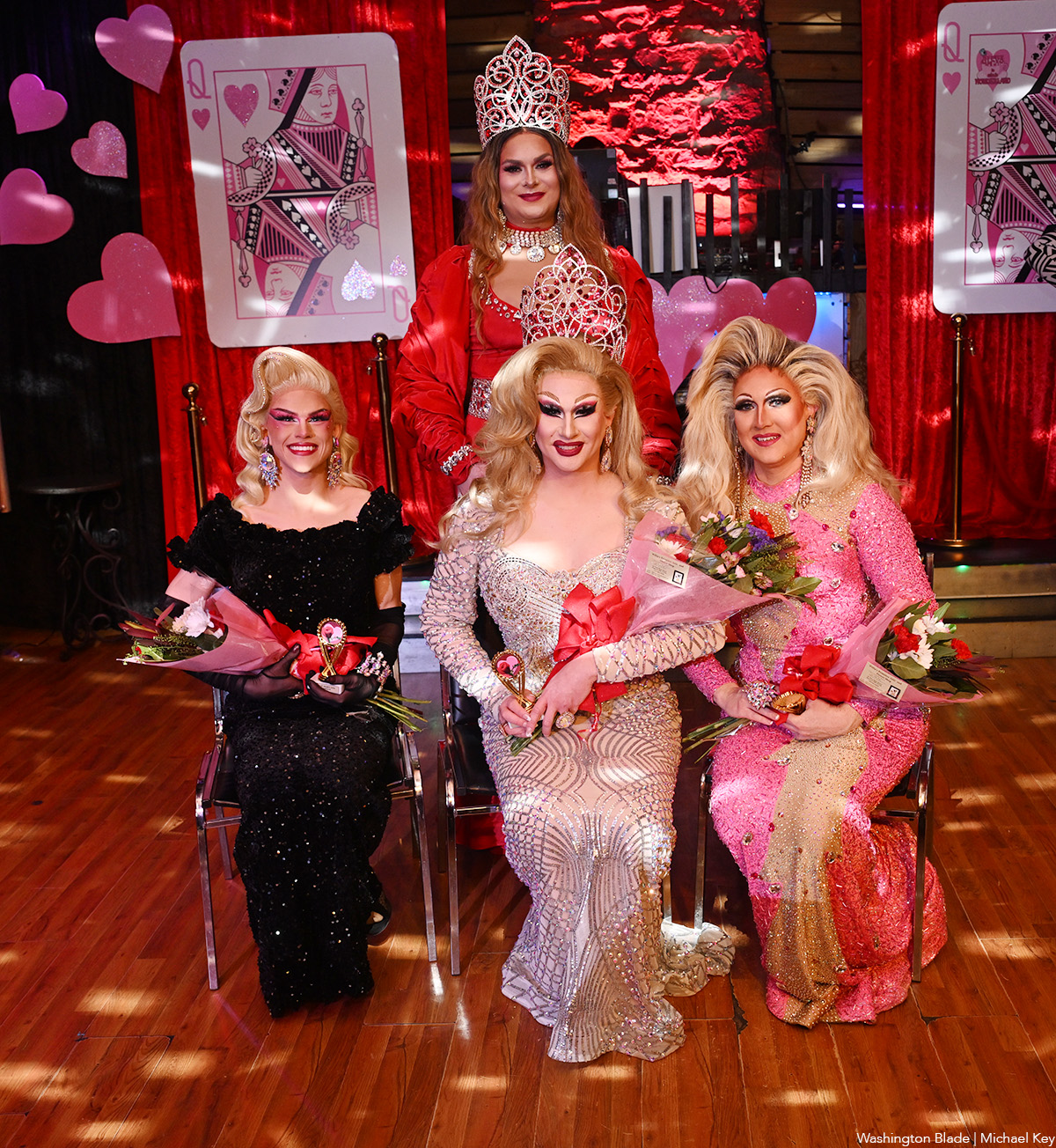
View on Threads
Books
New book profiles LGBTQ Ukrainians, documents war experiences
Tuesday marks four years since Russia attacked Ukraine

Journalist J. Lester Feder’s new book profiles LGBTQ Ukrainians and their experiences during Russia’s war against their country.
Feder for “The Queer Face of War: Portraits and Stories from Ukraine” interviewed and photographed LGBTQ Ukrainians in Kyiv, the country’s capital, and in other cities. They include Olena Hloba, the co-founder of Tergo, a support group for parents and friends of LGBTQ Ukrainians, who fled her home in the Kyiv suburb of Bucha shortly after Russia launched its war on Feb. 24, 2022.
Russian soldiers killed civilians as they withdrew from Bucha. Videos and photographs that emerged from the Kyiv suburb showed dead bodies with their hands tied behind their back and other signs of torture.

Olena Shevchenko, chair of Insight, a Ukrainian LGBTQ rights group, wrote the book’s forward.

The book also profiles Viktor Pylypenko, a gay man who the Ukrainian military assigned to the 72nd Mechanized Black Cossack Brigade after the war began. Feder writes Pylypenko’s unit “was deployed to some of the fiercest and most important battles of the war.”
“The brigade was pivotal to beating Russian forces back from Kyiv in their initial attempt to take the capital, helping them liberate territory near Kharkiv and defending the front lines in Donbas,” wrote Feder.
Pylypenko spent two years fighting “on Ukraine’s most dangerous battlefields, serving primarily as a medic.”
“At times he felt he was living in a horror movie, watching tank shells tear his fellow soldiers apart before his eyes,” wrote Feder. “He held many men as they took their final breaths. Of the roughly one hundred who entered the unit with him, only six remained when he was discharged in 2024. He didn’t leave by choice: he went home to take care of his father, who had suffered a stroke.”
Feder notes one of Pylypenko’s former commanders attacked him online when he came out. Pylypenko said another commander defended him.
Feder also profiled Diana and Oleksii Polukhin, two residents of Kherson, a port city in southern Ukraine that is near the mouth of the Dnieper River.
Ukrainian forces regained control of Kherson in November 2022, nine months after Russia occupied it.
Diana, a cigarette vender, and Polukhin told Feder that Russian forces demanded they disclose the names of other LGBTQ Ukrainians in Kherson. Russian forces also tortured Diana and Polukhin while in their custody.
Polukhim is the first LGBTQ victim of Russian persecution to report their case to Ukrainian prosecutors.

Feder, who is of Ukrainian descent, first visited Ukraine in 2013 when he wrote for BuzzFeed.
He was Outright International’s Senior Fellow for Emergency Research from 2021-2023. Feder last traveled to Ukraine in December 2024.
Feder spoke about his book at Politics and Prose at the Wharf in Southwest D.C. on Feb. 6. The Washington Blade spoke with Feder on Feb. 20.
Feder told the Blade he began to work on the book when he was at Outright International and working with humanitarian groups on how to better serve LGBTQ Ukrainians. Feder said military service requirements, a lack of access to hormone therapy and documents that accurately reflect a person’s gender identity and LGBTQ-friendly shelters are among the myriad challenges that LGBTQ Ukrainians have faced since the war began.
“All of these were components of a queer experience of war that was not well documented, and we had never seen in one place, especially with photos,” he told the Blade. “I felt really called to do that, not only because of what was happening in Ukraine, but also as a way to bring to the surface issues that we’d had seen in Iraq and Syria and Afghanistan.”

Feder also spoke with the Blade about the war’s geopolitical implications.
Russian President Vladimir Putin in 2013 signed a law that bans the “promotion of homosexuality” to minors.
The 2014 Winter Olympics took place in Sochi, a Russian resort city on the Black Sea. Russia annexed Crimea from Ukraine a few weeks after the games ended.
Russia’s anti-LGBTQ crackdown has continued over the last decade.
The Russian Supreme Court in 2023 ruled the “international LGBT movement” is an extremist organization and banned it. The Russian Justice Ministry last month designated ILGA World, a global LGBTQ and intersex rights group, as an “undesirable” organization.
Ukraine, meanwhile, has sought to align itself with Europe.
Ukrainian President Volodymyr Zelenskyy after a 2021 meeting with then-President Joe Biden at the White House said his country would continue to fight discrimination based on sexual orientation and gender identity. (Zelenskyy’s relationship with the U.S. has grown more tense since the Trump-Vance administration took office.) Zelenskyy in 2022 publicly backed civil partnerships for same-sex couples.
Then-Ukrainian Ambassador to the U.S. Oksana Markarova in 2023 applauded Kyiv Pride and other LGBTQ and intersex rights groups in her country when she spoke at a photo exhibit at Ukraine House in D.C. that highlighted LGBTQ and intersex soldiers. Then-Kyiv Pride Executive Director Lenny Emson, who Feder profiles in his book, was among those who attended the event.
“Thank you for everything you do in Kyiv, and thank you for everything that you do in order to fight the discrimination that still is somewhere in Ukraine,” said Markarova. “Not everything is perfect yet, but you know, I think we are moving in the right direction. And we together will not only fight the external enemy, but also will see equality.”
Feder in response to the Blade’s question about why he decided to write his book said he “didn’t feel” the “significance of Russia’s war against Ukraine” for LGBTQ people around the world “was fully understood.”
“This was an opportunity to tell that big story,” he said.
“The crackdown on LGBT rights inside Russia was essentially a laboratory for a strategy of attacking democratic values by attacking queer rights and it was one as Ukraine was getting closet to Europe back in 2013, 2014,” he added. “It was a strategy they were using as part of their foreign policy, and it was one they were using not only in Ukraine over the past decade, but around the world.”
Feder said Republicans are using “that same strategy to attack queer people, to attack democracy itself.”
“I felt like it was important that Americans understand that history,” he said.

More than a dozen LGBTQ athletes won medals at the Milan Cortina Winter Olympics that ended on Sunday.
Cayla Barnes, Hilary Knight, and Alex Carpenter are LGBTQ members of the U.S. women’s hockey team that won a gold medal after they defeated Canada in overtime. Knight the day before the Feb. 19 match proposed to her girlfriend, Brittany Bowe, an Olympic speed skater.
French ice dancer Guillaume Cizeron, who is gay, and his partner Laurence Fournier Beaudry won gold. American alpine skier Breezy Johnson, who is bisexual, won gold in the women’s downhill. Amber Glenn, who identifies as bisexual and pansexual, was part of the American figure skating team that won gold in the team event.
Swiss freestyle skier Mathilde Gremaud, who is in a relationship with Vali Höll, an Austrian mountain biker, won gold in women’s freeski slopestyle.
Bruce Mouat, who is the captain of the British curling team that won a silver medal, is gay. Six members of the Canadian women’s hockey team — Emily Clark, Erin Ambrose, Emerance Maschmeyer, Brianne Jenner, Laura Stacey, and Marie-Philip Poulin — that won silver are LGBTQ.
Swedish freestyle skier Sandra Naeslund, who is a lesbian, won a bronze medal in ski cross.
Belgian speed skater Tineke den Dulk, who is bisexual, was part of her country’s mixed 2000-meter relay that won bronze. Canadian ice dancer Paul Poirier, who is gay, and his partner, Piper Gilles, won bronze.
Laura Zimmermann, who is queer, is a member of the Swiss women’s hockey team that won bronze when they defeated Sweden.
Outsports.com notes all of the LGBTQ Olympians who competed at the games and who medaled.




















